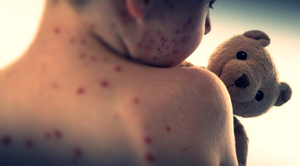Study claims measles vaccine 2.6x more ineffective in kids born via C-sec
By IANS | Published: May 13, 2024 03:29 PM2024-05-13T15:29:35+5:302024-05-13T15:30:13+5:30
New Delhi, May 13 A single dose of the measles vaccine is up to 2.6 times more likely ...

Study claims measles vaccine 2.6x more ineffective in kids born via C-sec
New Delhi, May 13 A single dose of the measles vaccine is up to 2.6 times more likely to be completely ineffective in children born by C-section, compared to those born naturally, claims a study on Monday.
Measles is a highly infectious disease preventable by vaccines. However, failure of the jab can significantly increase the risk of an outbreak.
The study led by a team of researchers from the universities of Cambridge, UK, and Fudan in China, showed that a second measles jab is vital and induces a robust immunity against measles in children born via C-section.
The study, published in the journal Nature Microbiology, found that the vaccine's effect is linked to the development of the child's gut microbiome -- the vast collection of microbes that naturally live inside the gut. Vaginal birth is known to transfer a greater variety of microbes from mother to baby, which can boost the immune system.
“We've discovered that the way we're born -- either by C-section or natural birth -- has long-term consequences on our immunity to diseases as we grow up," said Professor Henrik Salje in the University of Cambridge's Department of Genetics.
"Infants born by C-section are the ones we really want to be following up to make sure they get their second measles jab because their first jab is much more likely to fail," he added.
At least 95 per cent of the population needs to be fully vaccinated to keep measles under control.
For the study, the team used data from previous studies of over 1,500 children in Hunan, China, which included blood samples taken every few weeks from birth to the age of 12.
They found that 12 per cent of children born via caesarean section had no immune response to their first measles vaccination, as compared to 5 per cent of children born by vaginal delivery.
Disclaimer: This post has been auto-published from an agency feed without any modifications to the text and has not been reviewed by an editor
Open in app